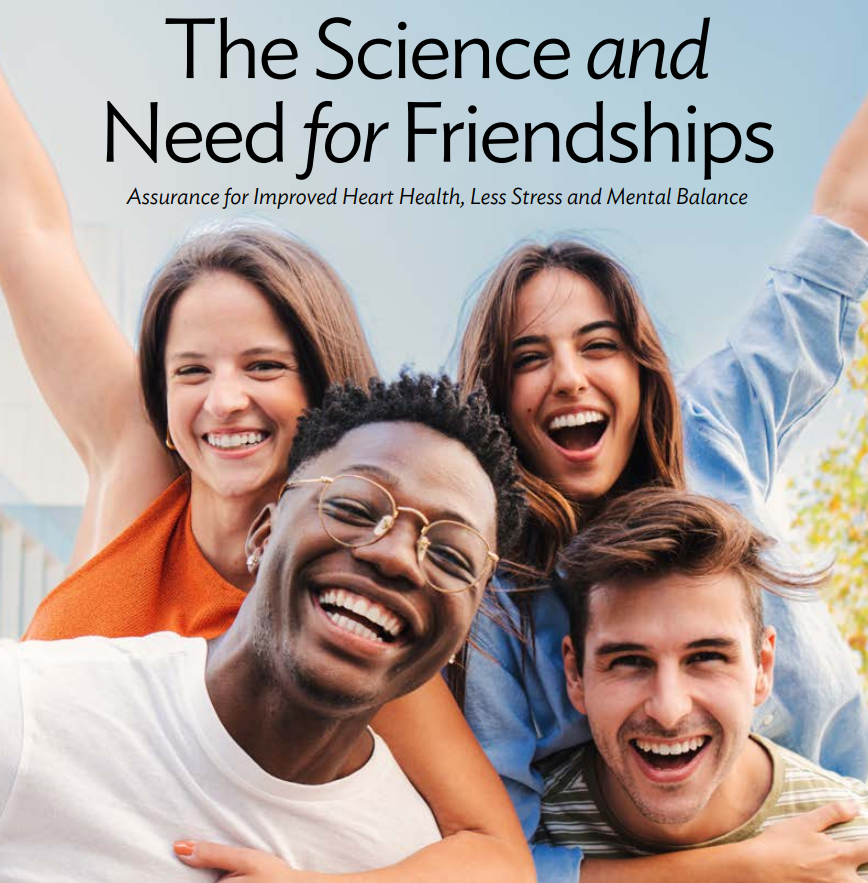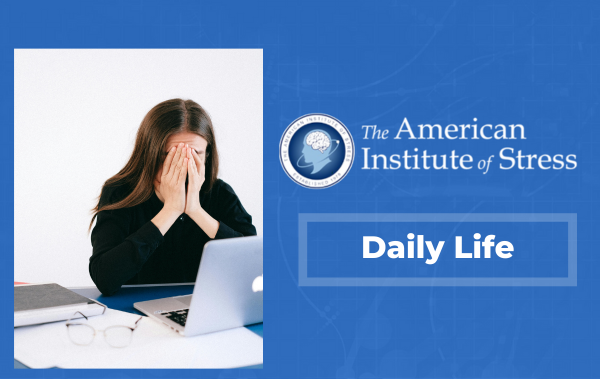
*This is an article from the Winter 2023-24 issue of Contentment Magazine.
“In the face of life’s challenges, having a close friend to turn to seems to be a buffer or protective factor against some of the negative outcomes we might otherwise see.”
Catherine Bagwell, PhD
By Linda Penkala, LMT
As I look back on my life as a child growing up with three younger brothers and one older sister in Queens, N.Y. as a tomboy, I had some girl friends in the neighborhood, including Girl Scouts and friends at school. But there were always times when simply playing wire ball, football, or stoop ball, was a key social component to my life, and many times with the boys! There were moments when I had a hoot with my girlfriends, but I also appreciated my time with the guys. Never did I imagine that there was a benefit to friendships back then, that could possibly affect my health as it was all pure fun. But now the light shines bright on this Vitamin F, and it becomes evident we have to take it to heart.
Friendships and Mental Health
For health and mental wellbeing, the compelling research on the value of friends is deep and worthy of interest and time. According to the American Journal of Psychiatry, those who have close friends are happier with their lives and suffer from less depression.1 There exists a high probability that if people are less connected and not social, due to isolation and a lack of nourishing relationships, they have a higher risk of premature death. The sobering part of these sad statistics is that they may also die from a host of chronic diseases; most importantly cardiovascular disease.2
Loneliness along with social isolation and the biological stress that ensues has been front and center in many media articles and is backed by in-depth research. It seems loneliness can be harmful to health in regard to white blood cells that play a part in a strong immune system. Steve Cole, MD found that chronic loneliness affects stress by way of the sympathetic (fight or flight) part of the central nervous system. This sets the stage for a higher level of inflammation, thus less immunity in those who are living a lonely life.3
Bringing people together in social groups in older communities can have positive benefits, by lowering a sense of loneliness and improving mental health. Dr. Julene Johnson, a San Francisco researcher on the effects of aging brought older adults in 12 senior centers together for a study to see the difference in those who joined a 90-minute choir session, and those that did not. The result of those who sang together after taking their psychosocial evaluation, revealed they felt less lonely by developing a newfound social interest in their lives. Consequently, those in the non-choir group did not have any changes in their loneliness, and their life interest actually declined.4
The bright side and positive component of having close friends is in regard to our own health and wellness. Healthy friends help other friends see the difference between making intentional healthier lifestyle choices in life, or not. This may be in regard to smoking, taking time for exercising and moving more, choosing to take up yoga, beginning to meditate, praying more, finding time to get a massage to reduce stress, or simply learning a new breathing technique to calm down. Witnessing a friend embark on a weight loss mission can impact one’s own dedication to healthier weight options, along with proactive choices.5 It appears that when one is surrounded by a positive life changing decision, it can influence and impact a friend’s life into the future.
Does Friendship Make Life Meaningful?
Support systems abound for those that live in advanced economies when asked the question, “what makes life meaningful?” Might we find that friendship made it in the top three answers? Yes, as the Pew Research Center compiled the data from over 19,000 people from these countries: Australia, New Zealand, Sweden, France, Greece, Germany, Canada, Singapore, Italy, Netherlands, Belgium, Japan, UK, US, Spain, South Korea, and Taiwan.6 The first choice of what makes life meaningful was FAMILY in 15 of the 17 countries, with OCCUPATION coming in second for about half of them, while FRIENDSHIP came in a distant third place in meaning for those in Australia, New Zealand, and Sweden. In fourth and fifth place, FRIENDS were only chosen seven times.
Friendship and the Surgeon General
Doing a deep dive into why friendships matter with US Surgeon General Dr. Vivek Murthy on his podcast House Calls, friendship expert Dr. Marisa G. Franco illuminates the value of friendship along with current trends.7 She is the author of the book, Platonic: How the Science of Attachment Can Help You Make and Keep Friends, along with being the assistant clinical professor at the University of Maryland, teaching about loneliness and friendship. Dr. Franco is passionate in her stance that strong friendships are the pillar of healthy lives. She states that she is seeing how friendship networks have been shrinking over the last few decades. They both agreed that in their professional lives teaching and traveling, when speaking on loneliness many in their audiences feel lonely. Dr. Franco states that friends help protect cognitive health, and conversations are like food to the brain.
Dr. Franco has a unique proposition that friendship is more like a responsibility, and an investment in another whose back you have and can be counted on to be emotionally supportive through the years in good times or bad. In the end it comes down to committing to an intentional investment in time and energy to have a meaningful friendship helping each other’s successes and goals.
She found in her research that men are different when they get married, as they tend to be okay letting go of some friendships, whereas women tend to keep their friendships vital and present in their lives. For men to believe that friendship is organic, and not intentional to connect with other men, may be a false narrative. It is the connection that allows for vulnerability that Dr. Franco says is key for men’s unique view on their outreach to friends.

Friendship Statistics Post-Pandemic
The depth and breadth of the impact friendship has on the health and longevity of the body, mind and soul, sets a new standard and paradigm for connections. This reciprocal bond of caring and affection is the cornerstone of a balanced life of friends, family, community, along with spirituality. Making intentional time to invest in friendships especially after the pandemic comes with and a deep need to connect once again, despite the stress, loss, grief and hardships the pandemic gave so many.
In a 2021 survey from the Survey Center of American Life comes research that Americans talk less with their friends, do not turn to them for support personally, and communicate less with those friends. The pandemic as the force for this sea of change resulted in 47% of those surveyed losing touch with friends from May 2020 through May 2021. The group at the highest percentage of loss were young women 18-29 or 59% of participants. In regard to men and women, the latter receive more emotional support from friends than the former.
Friendship and Connections Help Longevity
Author of the #1 New York Times best seller, The Blue Zones Kitchen, Dan Buettner has traveled the globe finding the common denominator for longevity in those living robustly beyond 100 years of age. His Blue Zones Power 9: Lifestyle Habits of the World’s Healthiest, Longest-Lived People, includes three components on heart connections. They BELONG, to a faith-based group, LOVED ONES FIRST, putting family first and taking care of them, RIGHT TRIBE, creating moais as Okinawans do, which is a circle of 5 friends committed to each other for life.8 His quote says it all:

“I argue that the most powerful thing you can do to add healthy years is to curate your immediate social network,” said Mr. Buettner, who advises people to focus on three to five real-world friends rather than distant Facebook friends. “In general, you want friends with whom you can have a meaningful conversation,” he said. “You can call them on a bad day, and they will care. Your group of friends are better than any drug or anti-aging supplement and will do more for you than just about anything.”
Friendships Protect the Heart
My own personal struggle not seeing my family during the pandemic, including my six grandchildren was without a doubt hard on my heart. Those video chats and seeing them for Christmas in my driveway exchanging gifts doing those crazy self-hugs was enough to break anyone’s heart. There were moments when a simple, long quiet drive to cry was all the medicine I needed, to purify stress and negativity through my tears, to feel better. But it was during those months of social isolation from friends that impacted my happiness quotient, from laughing, to sharing a great meal, or a long walk. The evidence and clinical research that friends are nourishing for the heart is profound!
According to The National Institute of Mental Health the impact of the two types of stress are the reasons. Acute or occasional stress or chronic stress that continues long term plays out in a chemical cocktail of hormonal changes. The fight-flight-freeze component of the sympathetic nervous system turns on to handle the situation in the acute phase. The failure happens when that system stays in hyper mode, cascading a flood of cortisol, adrenaline and epinephrine that effects the cardiovascular, immune, reproductive, and respiratory systems along with sleep.9 The bottom line is that acute or chronic psychosocial stress is the driver behind chronic inflammation, which sets the stage for cardiovascular disease progression along with strokes. As the founder of the American Institute of Stress, Dr. Paul Rosch taught us, it is stress and chronic inflammation that is the biggest driver behind cardiovascular disease.
The healing balm of all the above statistics and research is to lessen stress and find self-regulating tools to engage and activate the parasympathetic nervous system to aid homeostasis in the body. The favorites I teach are Box Breathing, taught in the Navy Seal’s training, to help focus and stay calm in the midst of great challenges.
Box Breathing:
Step 1: Breathe in, counting to 4 slowly. Feel the air enter your lungs.
Step 2: Hold your breath for 4 seconds. Try to avoid inhaling or exhaling for 4 seconds.
Step 3: Slowly exhale through your mouth for 4 seconds.
Step 4: Repeat steps 1 to 3 until you feel calm and relaxed.
Another is StimVn (stimulate the vagus nerve) breathing. I coined this type where you inhale into the belly, then lungs, and exhale through the mouth AHHH, or humming out the exhale. Implementing these breathing techniques into daily life, while driving, about to fall sleep, during a massage, or even before a sports competition can enhance the function of the central nervous system. This helps increase the happy hormone oxytocin to buffer the stress response. Oxytocin can also be raised by bonding with friends, laughing and hugging.10
At the end of the day, it is friends that add to the spice of life and allow the connection of the hearts to enhance longevity, wellness and health. The five F’s say it all:
FAMILY, FUN, FAITH, FOOD, FRIENDS – intentional choices, with the bookends being family and friends for a robust life.
References
- Choi, K., et al., The American Journal of Psychiatry, 177(10), 2020.
- Wing R. R., Jeffery R. W. Benefits of recruiting participants with friends and increasing social support for weight loss and maintenance. J. Consult. Clin. Psychol. 67 132–138. 10.1037, 1999.
ABOUT THE AUTHOR
 Optimum Health for Life is Linda Penkala’s wellness company that offers health and wellness presentations, by Zoom or in person, and therapeutic massage incorporating aromatherapy, light therapy, and Thai massage. Her passion and heart for holistic lifestyle choices can be found through published articles on her website, www.lindpenkala.com, and in Linda’s book The Pause to Relax Ladies for Robust Heart Health. Blending her first career as a jockey with her current one as an LMT for 36 years reveals powerful analogies regarding speed, stress, and the effects of not paying attention to proactive lifestyle choices for heart health.
Optimum Health for Life is Linda Penkala’s wellness company that offers health and wellness presentations, by Zoom or in person, and therapeutic massage incorporating aromatherapy, light therapy, and Thai massage. Her passion and heart for holistic lifestyle choices can be found through published articles on her website, www.lindpenkala.com, and in Linda’s book The Pause to Relax Ladies for Robust Heart Health. Blending her first career as a jockey with her current one as an LMT for 36 years reveals powerful analogies regarding speed, stress, and the effects of not paying attention to proactive lifestyle choices for heart health.
Contentment Magazine
The dictionary defines “content” as being in a state of peaceful happiness. The AIS magazine is called Contentment because we want all of our guests and members to find contentment in their lives by learning about stress management and finding what works best for each them. Stress is unavoidable, and comes in many shapes and sizes that makes being in a state of peaceful happiness seem like a very lofty goal. But happiness is easy to find once you are able to find ways to manage your stress and keep a healthy perspective when going though difficult times in life. You will always have stress, but stress does not always have you!





